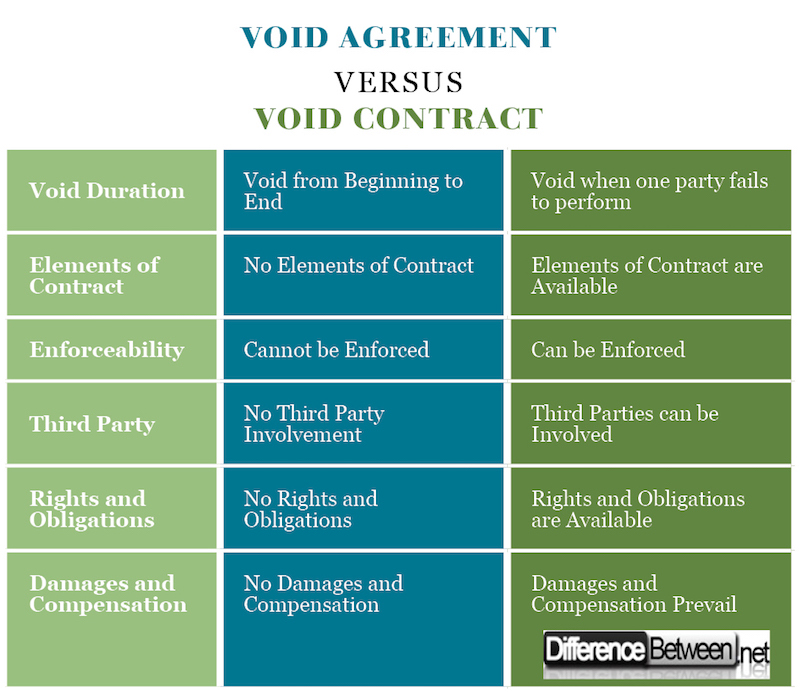Difference Between Void Agreement and Void Contract
The terms used in the field of business contracts seem to contradict many people, especially those who do not have a legal background. Void agreements and void agreements are some of the commonly used words that people cannot tell the difference.
It has been observed that the terms void agreement and void contract are used continuously interchangeably or in the place of one another which results in ambiguity and lack of understanding between various parties.

What is Void Agreement?
The term void agreement is used to represent or to refer to an agreement between two or more people that cannot be enforced by the court of law. This agreement does not have the essentials to confer rights to the concerned parties, which means that it lacks legal consequences. It is essential to understand that void agreements can never be turned into valid contracts at any stage.
What is Void Contract?
The term void contract is used to refer to a valid contract that can be enforced by a court of law because it meets all the essential elements of a valid contract until it reaches to a certain point where the contract cannot be performed hence rendering it to be enforceable. This means that such contracts do not have any legal effect and no party involved can enforce the contract.

Difference Between Void Agreement and Void Contract
1) Duration of Void Agreement and Void Contract
The duration under which a void agreement and void contract are enforceable by the law outlines one of the significant difference between the two forms of relationship between parties. Void agreements are not binding from the beginning at any stage and until the end. They remain void and cannot be enforced by any court of law. This is not the same for void contracts because they are enforceable at the beginning because they have ascertained all the essentials of a valid contract until a certain time reaches where they are declared void and cannot be enforced by the court. Some of the conditions that render a void contract unenforceable include illegality and difficulty in performing.
2) Essential Elements of Void Agreement and Void Contract
In a void agreement, crucial elements of a contract, which include consideration, offer, acceptance, and capacity to contract among others, are missing. Therefore, the contract does not exist and is not recognized under the law of contract, which prevails in different countries around the world. On the other hand, all the necessary elements of a contract can be ascertained at the beginning, which makes it a valid contract. However, the contract becomes voidable because the consent of one of the parties involved in the contract is not free. Probably illegality has been committed, or one party feels that he or she will not benefit from the contract hence making it a void contract.
3) Enforceability of Void Agreement and Void Contract
Any party involved because the legal provisions governing contracts between different parties do not recognize them cannot enforce void agreements. They do not meet the basic principles of a legally binding agreement hence no party can seek legal redress or enforce the other party to conduct his or her obligations under legal premises. However, void contracts can be enforced under the legal provisions of the law, which means that any party can enforce the other party to perform his or her obligations if the aggrieved party does not refuse the validity of the contract. Until the aggrieved party repudiates, the contract remains enforceable.
4) Involvement of Third Party in Void Agreement and Void Contract
The provisions of the law provide that a third party cannot be involved in a void agreement because it is not recognized neither enforceable under the law of contract. However, in a void contract, a third party who is involved in good faith and under consideration acquires good title to the goods purchased because the contract is recognized and enforceable by the law. However, if the third party is involved after one of the party repudiates the contract, he or she does not acquire a good title and is therefore not protected by the legal provisions under the law of contract.
5) Rights and Obligations of Void Agreement and Void Contract
A void agreement does not create any right or obligations to the parties involved because the law as it lacks the basic principles to be considered does not recognize it. On the other hand, a void contract creates rights and obligations to all the parties involved. A party enjoying goods and services as his or her rights must pay for those goods in the sum of money agreed upon which failure to pay will be enforced under the legal provisions. Additionally, the party who has the right to be paid must deliver goods and services in the agreed quality and form.
6) Damages and Compensation for Void Agreement and Void Contract
The concept of damages and compensation does not arise under void agreements if one of the individuals fails to perform his or her obligations and the parties are required to settle the differences among themselves. This is not the same for the void contract because any party that fails to perform his or her obligations is required to pay for damages or compensate the other party in either monetary terms or any other form of compensation that may be deemed fair by the court of law.
Difference Between Void Agreement and Void Contract: Comparison chart

Summary of Void Agreement vs. Void Contract
- Understanding the difference between void agreement and void contract is important because it helps individuals to understand what is at their disposal.
- Besides, a person who understands the difference between the two terms will appreciate his or her rights if they have been compromised and can seek legal redress if it was a void contract.
- Difference Between Gross NPA and Net NPA - April 20, 2018
- Difference Between Job Description and Job Specification - April 13, 2018
- Difference Between Yoga and Power Yoga - April 10, 2018
Search DifferenceBetween.net :
Leave a Response
References :
[0]Kremer, Ben. "Recovering Money Paid under Void Contracts: “Absence of Consideration” and Failure of Consideration’(2001)." Journal of Contract Law 17: 37-43.
[1]Swift, Kenneth R. "Void Agreements, Knocked-Out Terms, and Blue Pencils: Judicial and Legislative Handling of Unreasonable Terms in Noncompete Agreements." Hofstra Lab. & Emp. LJ 24 (2006): 223.
[2]Welsh, Joshua R. "Has Expansion of the Federal Arbitration Act Gone Too Far: Enforcing Arbitration Clauses in Void Ab Initio Contracts." Marq. L. Rev. 86 (2002): 581.
[3]Image Credit: https://pixabay.com/en/contract-agreement-signature-3002431/
[4]Image Credit: https://www.flickr.com/photos/143601516@N03/27571322193
